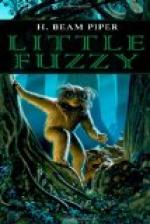He’d heard that land-prawns had no natural enemies; he questioned that. Something killed them. He’d seen crushed prawn shells, some of them close to his camp. Maybe stamped on by something with hoofs, and then picked clean by insects. He’d ask Ben Rainsford; Ben ought to know.
Half an hour later, the scanner gave him another interruption pattern. He laid it aside and took up the small vibrohammer. This time it was a large bean, light pink in color, He separated it from its matrix of flint and rubbed it, and instantly it began glowing.
“Ahhh! This is something like it, now!”
He rubbed harder; warmed further on his pipe bowl, it fairly blazed. Better than a thousand sols, he told himself. Good color, too. Getting his gloves off, he drew out the little leather bag from under his shirt, loosening the drawstrings by which it hung around his neck. There were a dozen and a half stones inside, all bright as live coals. He looked at them for a moment, and dropped the new sunstone in among them, chuckling happily.
* * * * *
Victor Grego, listening to his own recorded voice, rubbed the sunstone on his left finger with the heel of his right palm and watched it brighten. There was, he noticed, a boastful ring to his voice—not the suave, unemphatic tone considered proper on a message-tape. Well, if anybody wondered why, when they played that tape off six months from now in Johannesburg on Terra, they could look in the cargo holds of the ship that had brought it across five hundred light-years of space. Ingots of gold and platinum and gadolinium. Furs and biochemicals and brandy. Perfumes that defied synthetic imitation; hardwoods no plastic could copy. Spices. And the steel coffer full of sunstones. Almost all luxury goods, the only really dependable commodities in interstellar trade.
And he had spoken of other things. Veldbeest meat, up seven per cent from last month, twenty per cent from last year, still in demand on a dozen planets unable to produce Terran-type foodstuffs. Grain, leather, lumber. And he had added a dozen more items to the lengthening list of what Zarathustra could now produce in adequate quantities and no longer needed to import. Not fishhooks and boot buckles, either—blasting explosives and propellants, contragravity-field generator parts, power tools, pharmaceuticals, synthetic textiles. The Company didn’t need to carry Zarathustra any more; Zarathustra could carry the Company, and itself.
Fifteen years ago, when the Zarathustra Company had sent him here, there had been a cluster of log and prefab huts beside an improvised landing field, almost exactly where this skyscraper now stood. Today, Mallorysport was a city of seventy thousand; in all, the planet had a population of nearly a million, and it was still growing. There were steel mills and chemical plants and reaction plants and machine works. They produced all their own fissionables, and had recently begun to export a little refined plutonium; they had even started producing collapsium shielding.




